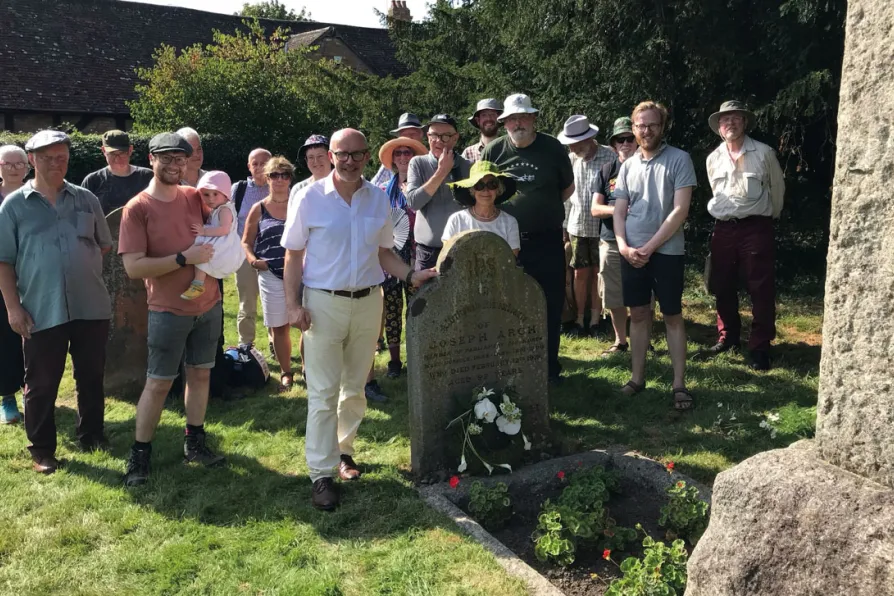Does widespread and uncontrolled use of AI change our relationship with scientific meaning? Or with each other? ask ROX MIDDLETON, LIAM SHAW and MIRIAM GAUNTLETT
Our annual memorial event and lecture honouring a legend of English working-class history, who ‘organised the unorganisable’ in the countryside, will hear from today’s organisers of the unorganisable fighting the bosses of Amazon, writes NICK MATTHEWS

 HONOURED: Matt Western, MP for Warwick and Leamington, lays the wreath on Joseph Arch’s grave, 2024
HONOURED: Matt Western, MP for Warwick and Leamington, lays the wreath on Joseph Arch’s grave, 2024
ON Joseph Arch Day, we celebrate the rural roots of our movement. I am still surprised to find just how deep and how long the efforts by rural workers have been for economic and social justice.
On these days, as well as commemorating the role of Arch in the creation of the Agricultural Workers Union in 1872, we have explored the whole history of rural struggle and the lessons for today.
Nowadays, our image of rural Britain is largely one of Countryfile and bucolic TV advertisements. It was Raymond Williams in his marvellous book The Country and the City, who debunked the notion of rural life as simple, natural and unadulterated, leaving us with an image of country life as if living in some kind of golden age.
This is, according to Williams, “a myth functioning as a memory” that dissimulates class conflict, enmity and animosity that had been present in rural Britain since the 16th century.
Our speakers to date have explored the origins of this rural revolt and shown that they began much earlier than the 16th century. Last year, James Crossley talked about the parallels between the travails of Victorian farmworkers and the mythology around John Ball and the peasants’ revolt of 1381.
Previously, Martin Empson had talked about how the modern English countryside was a result of centuries of class struggle and environmental change.
Religion, particularly religious dissent, has played a crucial part in all these struggles. It is hard for us today to appreciate how destabilising to the established church and state arguments within Christianity could be, from Wycliffe and the Lollards, to forces blowing into England from the continent following the Reformation — indeed, the English civil war was largely a product of the English Reformation.
Ironically, one religious group still thriving from the English civil war, the Quakers, has lost none of their ability to disturb the Establishment. Despite their pacifist beliefs — and you could not make this up — many of them have been labelled as terrorists for opposing the genocide in Gaza.
Part of the moral fervour of Joseph Arch came from his faith as a Primitive Methodist. He was a leading figure in the Prims, known colloquially as “the Methody” (as described by George Eliot in Adam Bede) and was well versed in public speaking.
Country preachers played a crucial role at that time, enabling labourers to develop, building respect and the capability to speak, read and write — but this caused tensions.
For many squires and parsons, the arrival of the “Methody” was an act of rebellion. Trade union organisation was often focused on the Methodist Chapel. As Eliot recorded in her notebooks, “The class Wesley liked least were the farmers!”
A clash was brewing, but Arch had a great advantage: he owned his own cottage and so was near untouchable for his radical activities.
Arch inspired generations of Agricultural Union activists, and his legacy echoes down the years. This year, our speaker will be Stuart Richards, the TUC Midlands region secretary. He will be talking more about the contemporary resonance of Arch’s life’s work.
A feature of the success Arch had was that he went on to organise workers who had been thought to be unorganisable. Today, that challenge falls to organisers like Richards, who has worked organising Amazon workers in sites across the Midlands.
Many of the terrible terms and conditions of employment suffered by agricultural workers in Arch’s time have resurfaced under a modern guise from employers like Amazon. Let the example of Joseph Arch inspire us to take up the challenge they have set us.
Joseph Arch Day 2025 is on September 20, starting in the village of Wellesbourne at 11am. For further information, contact tomwestbury@protomail.com.









